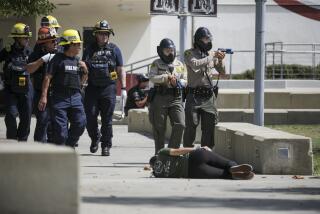CSU to Study Pacoima-Based Anti-Gang Push
- Share via
Gov. Pete Wilson has signed a bill providing $100,000 for the California State University system to study a Pacoima-based anti-gang program that seeks to prevent violence through sports tournaments and counseling.
Researchers will spend the next 15 months determining the effectiveness of Communities In Schools of San Fernando Valley), a nonprofit program that began with a local gang truce five years ago.
Supporters said they hoped the study will lead ultimately to the program’s duplication in other communities. The program includes former gang members and others who are counseling youths on how to manage their anger and deal peacefully with conflict.
“When you have effective programs, they tend to be headed by people who came from the streets,” said Assemblyman Tony Cardenas (D-Sylmar), who introduced the legislation that Wilson signed Monday. “I feel confident that this study will show we have something that is useful.”
Communities In Schools began informally in 1993 as the Valley Unity Peace Treaty, a truce among 75 gangs. The treaty was credited with helping reduce Valley gang slayings from 45 in 1993 to 29 in 1994.
The numbers of Valley gang homicides, however, fluctuated in the ensuing years--up to 41 in 1995, but down to 30 in 1996 and 33 in 1997. Los Angeles police said there have been 27 gang-related slayings valleywide between January and the end of last month.
Authorities said the Communities In Schools program helps individuals, but they stop short of crediting the group alone for reducing gang homicides. Any change in the amount of gang violence results from the efforts of police, community groups and others, authorities said.
“Is it a viable organization? Yes. Are they doing good? Yes,” Lt. Fred Tuller of the LAPD’s Valley Bureau gang unit said. “Can I make a direct correlation from their work to what is happening with gang crime? No. There are a lot of factors.”
William “Blinky” Rodriguez, executive director of Communities In Schools, welcomed the upcoming study. An independent, state-sanctioned review of the program could help spawn similar efforts across the state and demonstrate that his efforts in recent years were worthwhile, Rodriguez said.
“I hope it will document the pros and cons, and the ability of the community to gel and collaborate and rally around this whole notion of peace,” he said. “It’s something we’ve been working on for years. . . . There are real possibilities here.”
A Cal State University college has not yet been selected to conduct the study, but state officials said campuses in Northridge and Los Angeles are candidates. The study is scheduled for completion by Jan. 1, 2000.
More to Read
Sign up for Essential California
The most important California stories and recommendations in your inbox every morning.
You may occasionally receive promotional content from the Los Angeles Times.










